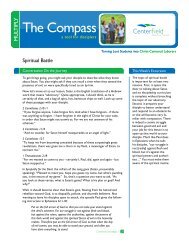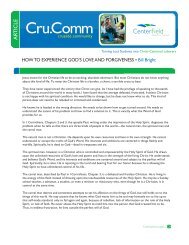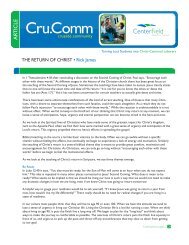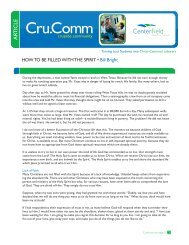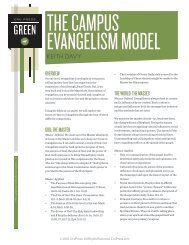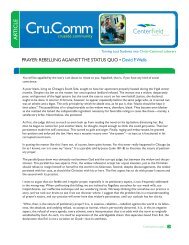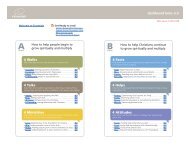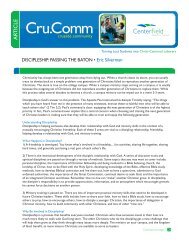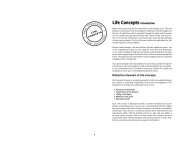Selection, by Eric Swanson - Cru Press Green
Selection, by Eric Swanson - Cru Press Green
Selection, by Eric Swanson - Cru Press Green
You also want an ePaper? Increase the reach of your titles
YUMPU automatically turns print PDFs into web optimized ePapers that Google loves.
ARTICLE<br />
SeleCTIon • <strong>Eric</strong> <strong>Swanson</strong><br />
“It all started <strong>by</strong> Jesus calling a few men to follow Him. This revealed immediately the direction His evangelistic<br />
strategy would take. His concern was not with programs to reach the multitudes, but with men whom the multitudes<br />
would follow....Men were His method of winning the world to God.” Robert Coleman in The Master Plan of<br />
Evangelism.<br />
<strong>Selection</strong> has to do with our calling as a movement—to fulfill the Great Commission in this generation. If we had<br />
unlimited time or fuzzy goals, we could individually work with anyone and everyone. But as it stands, as a matter<br />
of stewardship and effectiveness, we must be selective with who we choose to disciple. Like Jesus, we cannot and<br />
should not personally disciple everyone. We select, not to show favoritism, or elitism, but rather for a purpose—<br />
leadership development. The future of our movement rests on our next generation of leaders. Not everyone is<br />
called to lead, gifted to lead, or willing to lead. We are looking for spiritual leaders. It has been said that Christianity<br />
is only one generation from extinction. The selection, training, and development of leaders, insures that the faith<br />
will prosper and propagate.<br />
Jesus and <strong>Selection</strong><br />
Jesus was intentional about who He chose and intentional about what He wanted his disciples to do. After spending<br />
the night in prayer (Luke 6:12), “Jesus called to him those he wanted, and ...he appointed twelve...that they might<br />
be with him and that he might send them out to preach...” (Mark 3:13,14). Jesus did not invest His life in everyone.<br />
Certainly, He influenced the multitudes, but impacted and invested in the few. Coleman wrote of Jesus’ selection,<br />
“...though He did what He did to help the multitudes, He had to devote Himself primarily to a few men, rather than<br />
the masses, in order that the masses could at last be saved....One can not transform a world except as individuals<br />
in the world are transformed, and individuals cannot be changed except as they are molded in the hands of the<br />
Master.” Jesus knew that in order to change the world, it was far better to have twelve (really eleven) disciples who<br />
were 100% committed, than 100 tag-a-longs who were 12% committed.<br />
<strong>Selection</strong> and Basic Follow-up<br />
After introducing a person to Christ—or contacting a believer who wants to grow—one of the most helpful things<br />
you can do in this prayerful process, is basic follow-up. Basic follow-up accomplishes at least three things. First, it<br />
introduces students to the basics of the faith from which we live the Christian life. Second, it provides a context<br />
for building a relationship and provides a format for observing faithfulness and spiritual hunger. After meeting six<br />
or eight times individually with a student, you can personally determine who wants to continue to grow and who<br />
doesn’t. Third, it provides a model for what they will do with other students. Multiplication needs to be modeled.<br />
Don’t mistake follow-up with discipleship. Follow-up is comprised of those concepts which will begin the process<br />
of grounding a student in their faith. After follow-up, they now know what they need to do to keep growing...to<br />
become a disciple. Although all students may desire a spiritual mentor, we want to focus our individual attention on<br />
those who want have a desire to minister, share their faith, and help others grow. We are obligated to take everyone<br />
through follow-up, but we are not obligated to disciple/mentor everyone.<br />
Continued on page 2
ARTICLE ARTICLE TOPIC SELECTION TITLE<br />
2<br />
Who to Work With<br />
After follow-up, how do you determine who you should disciple?<br />
The oft-quoted admonition of the Apostle Paul in 2 Timothy 2 still stands as the plumb line for spiritual multiplication.<br />
“And the things you have heard me say in the presence of many witnesses entrust to faithful men who will<br />
be able to teach others also.” Historically, we have had two “entrance qualifications” for those we invest in—1) a<br />
teachable attitude, and 2) a heart for God. Added to these, ex-staff Cynthia Burnett, recommends three supplementary<br />
criteria for selection:<br />
• Willingness to share one’s faith.<br />
• Willingness to lead.<br />
• Wanting to do the above within the ministry of Campus <strong>Cru</strong>sade.<br />
Mark McCloskey writes, “By ‘selection’ we mean ‘choosing a few on which to focus from the many raised up<br />
through broad sowing and the filtering process.’ Just as Jesus’ ministry depended on those He selected from<br />
among the many, so will ours. Therefore, we must look for those qualities Jesus looked for when He selected His<br />
disciples—a heart for God, teachability, faithfulness, availability, and potential to multiply.”<br />
In <strong>Cru</strong>sade, we have historically used the criteria, “move with the movers,” which is to say, we work with those<br />
in whom God is already at work and in whose lives He is moving at this present time. How can you tell who the<br />
“movers” are? Just as Jesus could tell who was following Him simply <strong>by</strong> turning around, our litmus test is providing<br />
students with regular opportunities to declare themselves faithful in evangelism, training, the weekly meeting,<br />
retreats, etc. These people more or less select themselves. Disciples emerge from a multiplicity of growth opportunities.<br />
Actually, you can ask for any requirements that you want to, and then wait for God to raise up students<br />
who meet those qualifications. Your reasonable requirements can be the door through which you discover who<br />
God wants you to invest in. More than anything, selection is made on the basis of observation and prayer.<br />
Disciples are Made<br />
In his classic work, Disciples are Made—not Born, Walt Henrichsen outlines several principles to bear in mind in<br />
recruiting a prospective disciple, four of which are mentioned here:<br />
• Recruit to a vision, not to an organization.<br />
• Do not create the impression that people are doing you, or God, a favor <strong>by</strong> being faithful to the cause of Christ.<br />
• You recruit a man to discipleship <strong>by</strong> being his servant.<br />
• You reproduce after your own kind, whether you like it or not.<br />
Henrichsen emphasizes that in the process of making disciples, in order to impart biblical convictions and perspective,<br />
we should:<br />
• Major in principles rather than methods.<br />
• Major in meeting the needs of others rather than in developing and imparting techniques.<br />
• Major in developing the thought processes rather than the skills.<br />
• Major in how to trust God rather than teaching theories about God.<br />
Who Not to Work With<br />
Just as there are basic qualifications of potential disciples, there are also basic disqualifiers of who not to disciple.<br />
Barry Rush has identified six “leading indicators” of who not to disciple:<br />
• Refusal to share one’s faith.<br />
• no heart for God.<br />
• Unyielding to the lordship of Christ.<br />
• overly involved in other Christian groups.<br />
• Unwillingness to commit to the overall <strong>Cru</strong>sade movement.<br />
• emotionally unstable.<br />
Continued on page 3
ARTICLE SELECTION<br />
3<br />
When disqualifying a potential disciple, be certain that you distinguish between what is a settled conviction, and<br />
immaturity or ignorance. Sometimes it’s easy to think, “Well, it’s better to fill my schedule and disciple somebody<br />
(even though they don’t meet any of the requirements), than have an empty schedule.” This is not necessarily true.<br />
A schedule filled with the wrong people will keep one from evangelism and reaching out to others. The goal is not<br />
to simply be busy doing any kind of ministry. It is far better to disciple three of the right students, while looking for<br />
six more, than fifteen of the wrong students, who will never multiply and minister to others.<br />
Synergy and Movements<br />
Does the following scenario sound familiar? “Tim is discipling the sharpest guys in the ministry. The problem is<br />
none of them come to our retreats and conferences and rarely attend weekly meetings or even bible studies.”<br />
Remember...we are involved in a spiritual movement comprised of people going in the same direction. If those you<br />
are meeting with one on one, after follow-up (or a reasonable amount of time), are not significantly involved in<br />
the larger ministry, you will have very little momentum and synergy in your movement. What you do with them<br />
as individuals will be dissipated and not returned into the ministry. On the other hand, if the men you are meeting<br />
with get involved in the ministry, the time and energy you invest in them will be multiplied, as it is returned to the<br />
ministry. It will be very, very difficult to build a movement (or even a larger ministry) if those you are discipling are<br />
not involved in the larger <strong>Cru</strong>sade body.<br />
Our commitment to others is reciprocal to their commitment, not only to us, but also to <strong>Cru</strong>sade. Our history reveals<br />
that very, very few people go on in ministry leadership if they are not involved in the larger body. A good rule<br />
of thumb might be that four of five students you meet with after basic follow-up must be involved in the greater<br />
<strong>Cru</strong>sade ministry. The fifth person you meet with can be anyone you want to meet with. Sometimes you just have a<br />
hunch, that given enough time and love, a students will come around. However, these should be the exception, not<br />
the rule, of your ministry. others you can fit into your personal life but not necessarily your personal ministry.<br />
Multiplying Disciples<br />
Mark McCloskey writes that, “Discipleship simply means the ‘process of following Jesus and learning from Him.’<br />
Spiritual multiplication is a strategic form of discipleship intent on maximizing the number of laborers in the<br />
harvest. While all spiritual multipliers are disciples, not all disciples are spiritual multipliers.”<br />
Give plenty of opportunities for students to demonstrate their faithfulness. Most of the time, if our motives,<br />
purpose and objectives are clear—students, more or less select their own level of involvement. You can love and<br />
influence others without personally discipling them. Jesus ministered to the 5,000, the 500, the 120, and the seventy,<br />
as well as the twelve. He offered something—probably what they most needed—to everyone. Is there a place<br />
in your ministry for the “Barnabases” and “Geresene demoniacs” (presently clothed) as well as the “Timothys” and<br />
“Pricillas?”<br />
Remember, intentional leadership development is an organizational value, but in no way is a gauge of measuring<br />
the value of a person. Every student is deserving of an atmosphere of acceptance, love, and safety, regardless of<br />
ministry performance. In this type of environment, God will raise up His laborers.<br />
The Compass is the discipleship curriculum for Campus <strong>Cru</strong>sade for Christ’s Campus Ministry. It was created <strong>by</strong> Centerfield Productions,<br />
the field based division of <strong>Cru</strong><strong>Press</strong>. We’d love to hear your feedback on this lesson. Please write us at centerfield@uscm.org<br />
©2007 <strong>Cru</strong> <strong>Press</strong>, Campus <strong>Cru</strong>sade for Christ, Inc. All rights reserved.<br />
No part of this publication may be digitally reproduced, stored in a retrieval system, or transmitted, without the prior permission of <strong>Cru</strong> <strong>Press</strong>.<br />
End



